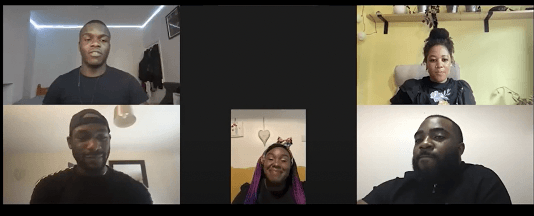AS part of the annual Féile an Phobail an online event has taken place to discuss what it means to be black and Irish.
The group Black and Irish was set up in the wake of George Floyd’s murder last year in Minneapolis to highlight and celebrate the identity of black and mixed race Irish people.
Chaired by Boni Odoemene, those taking part included co-founder of Black and Irish Ope Oworu, and Kenny Olaniyi, the Entertainment Coordinator for Black and Irish.
There certainly appeared to be a consensus amongst the panellists that growing up in Ireland as a black person meant that when you encountered racism, you never really stopped to think whether you were being singled out.
Kenny said: “I remember my experiences in school, what certain people did and was picked on in a kind of way. I didn’t understand why.
“Going back, you’re thinking maybe it was because being bullied in school as a normal kid, everybody gets it. Or maybe it was because I was a bit different.”
Maureen Hamblin, who was born in Kenya, grew up in Tallaght from the age of 11 and spent some time in the United States. She now lives in East Belfast and is married to a Northern Irish husband. The mother of three reflected about how even some of her own in-laws were racist on occasion.
It was “the straw that broke the camel’s back,” she said.
“In my head, I could always forgive the people on the bus… I’m not living with them, I don’t have to see them. But when they came so close to home, one of (her husband’s) relatives started saying ‘black people can't rule themselves’.”
“That got to me.”
Maureen is now educating her American born five-year-old son about what it might mean to return to the States should he choose to.
“We had to talk about the police.”
Angela O'Shaughnessy, a writer, storyteller and communications strategist, grew up between San Francisco and Donegal. She travels back and forth between the two places regularly but considers Donegal home.
“I was the only black person of my peers, friends. This was in the mid-90s”
“I was given a really hard time.”
Yet something extraordinary happened last year.
“When George Floyd was killed, all of these mass protests started happening. It was terrifying. And I was like ‘I’m getting out of here. I’m going back to Ireland.’”
“And it’s funny. It’s like going to the whitest place that you know but that was where I felt safe.”
Looking to the future, Kenny wants to give back and see more representation of black people in the media and celebrates how the mainstream media is starting to look a lot less white.
Angela would agree and would like to see more BAME people in place of power and making decisions.
Maureen desires to concentrate on families and helping them heal innerly and working on her children’s identity so that when they have grown up a bit, they are more aware of what to expect.





